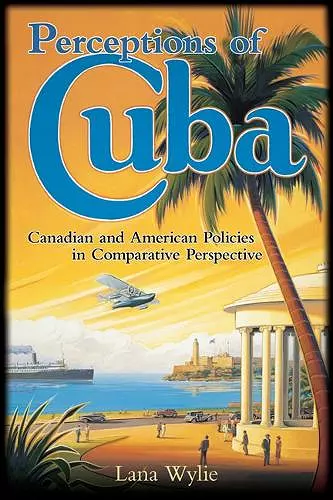Perceptions of Cuba
Canadian and American Policies in Comparative Perspective
Format:Paperback
Publisher:University of Toronto Press
Published:13th Mar '10
Currently unavailable, and unfortunately no date known when it will be back
This paperback is available in another edition too:
- Hardback£49.00(9781442640610)

'Perceptions of Cuba is a timely and important book. With a new administration in Washington, any changes to the place of Cuba in American foreign policy will have a direct impact on Canadian-Cuban relations. Lana Wylie's innovative book will broaden our theoretical and practical understanding of how foreign policy is shaped in Canada and the United States' -- Kevin Spooner, North American Studies Program, Wilfrid Laurier University 'Using a constructivist approach to explicate original interviews, media coverage, and elite perception, Perceptions of Cuba is an excellent and accessible analysis of U.S.-Cuban and Canadian-Cuban relations.' -- Tony Spanakos, Political Science and Law, Montclair State University
By acknowledging that competing national identities, perceptions, and ideas play a major role in foreign policies, Perceptions of Cuba makes a significant contribution to our understanding of international relations.
In 1976, with the US trade embargo against Cuba underway, Canada's Prime Minister Pierre Elliott Trudeau visited the island nation, befriended his counterpart, and exclaimed publicly "Long live Prime Minister Fidel Castro!" During the past half-century of communist rule in Cuba, Canada's policy of engagement with the country has contrasted sharply with the United States' policy of isolation. Based on a series of interviews conducted in Havana, Washington, and Ottawa, Perceptions of Cuba moves beyond traditional economic and political analyses to show that national identities distinct to each country contributed to the formation of their dissimilar foreign policies.
Lana Wylie argues that Canadians and Americans perceive Cuba through different lenses rooted in their respective identities: American exceptionalism made Cuba the polar opposite of the United States, while Canada's self-image as a good international citizen and as 'not American' has allowed the country to engage with the Cuban government. By acknowledging that competing national identities, perceptions, and ideas play a major role in foreign policies, Perceptions of Cuba makes a significant contribution to our understanding of international relations.
Wylie's account of the history of Canada and Cuba is almost nostalgic. What is distinct here? Why Cuba and not countless other places? This is the kind of book that makes one ask more questions. Wylie has provoked a fascinating and much-needed conversation on a new way of thinking about foreign relations. -- Karen Dubinsky: Canadian Historical Review; vol 92:03:2011
ISBN: 9781442610071
Dimensions: 230mm x 152mm x 11mm
Weight: 300g
176 pages